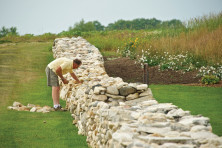Irish Spirit
- Share
- Tweet
- Pin
- Share
“Did you know that if you don’t listen to the elders who know, and build your new house on a fairy ring, you will have bad luck? Your workers will fall off the roof. ‘Tis true!”
“And did you know that poteen, homemade Irish whiskey, will bring a half-dead calf left out in the frost back to life if it is rubbed briskly on its legs? And if you put the poteen on a spoon and light it, it has a nice blue flame. Sure it does! Aye, ‘tis that good.”
I was on a 7 hour Air Lingus flight to the Emerald Isle. I wasn’t sleepy even though it was night. I was going to Ireland! I am not a world traveler by any stretch of the imagination. I get uneasy when in unfamiliar surroundings. My family would tell you that twice I got lost driving in the dark, coming home to Sturgeon Bay from Green Bay!
But I wasn’t afraid at all. I was listening raptly to Mr. Francis McVeigh from Donegal, an elderly gentleman who raised pacers. Everything about him was classic Irish, from his Donegal tweed herringbone cap, to his craggy nose, and jutting lower lip. While listening, I realized there was one more classic trait about him – as William Butler Yeat’s wrote: "Being Irish, he had an abiding sense of tragedy, which sustained him through temporary periods of joy."
He spoke slowly, quietly. "Back when England took over, they abolished Holy Mass. So the people had to hide when holding Mass, by large Mass rocks. One day a family hid the priest below the stairs in their house and saved him from the storming English. Afterwards, he told the family that they would never want for anythin’, and it was true, Aye, it was true."
"I know an old woman who lives near me,” he continued. “When she was a wee one she was in Germany, in a concentration camp. She tripped and fell down and her face went under the water which was on the floor. When she came up, all the people around her were dead – the Germans had turned on the gas. But they were afraid to try to kill her a second time. And today she’s 101 and with all her cooking and gardening and working, she would put me to shame. Aye, that she would."
I listened to him for hours. And then he offered to drive 45 miles to Derry (or Londonderry as the English call it) where I would be staying, to drive me and my party of four up to his homeland of Donegal, with the white beaches and beautiful scenery and then after showing us around, would drive us back again to our hotel. I was flabbergasted, but we were on a bus tour, and I didn’t think it would work out.
The very first morning at the Bunratty Castle Hotel after an especially good Irish breakfast of sausages, fresh eggs and toast, I stepped down the back stairs and walked into an ancient world – across a rain-puddled dirt road, an enclosed timeworn graveyard. Weedy flowers, grasses and vines had a foothold in the old rock walls and covered an old roofless building, possibly a small church. Cows basked in the early morning sunlight on a hill across from the graveyard and looked curiously at me while chewing their cuds. It was an unbelievable sight – the old and new together. The young kitchen worker came out the back door and smiled at me. I asked him if I could open the wrought iron gate and go into the graveyard. He said, "Sure y’ can! But, watch out for th’ wee dip in th’ back of th’ buildin.’ An’, don’t walk there at night. They’re ALOIVE!" The "wee dip" turned out to be sunken earth about 8 feet deep! The venerable Celtic crosses and the names carved in the stone grave markers made me think of the rich history of this land.
I took a walk to the folk park on a curving road with the castle looming high above me. A high ivied rock wall enclosed the park. Finches chirped, grey crows cawed loudly from multiple nests high in old beech trees. I paid my admission fee…and wandered right into my ancestor’s world. Colorful roosters crowed and hens pecked and scratched the dirt; old wooden boats, curraghs lay overturned near the cottages; goats bleated; farm implements were leaning against the cottage walls as if their owners had just come home and sweet smelling smoke rose out of the chimneys of the thatched dwellings. And stepping into the small doorway of a restored cottage in the folk park, with the lazy blue smoke of the peat burning in the blackened fireplaces, the sunlight streaming in the lace-curtained window, a crucifix on the whitewashed sill, a small chair or two around the blackened fireplace, and seeing the loft where there was room for a small bed above the fireplace – well, you could actually get a sense of something real. Like looking at an Old Master’s painting in a museum, you could almost feel the psychic presence of the people who had lived there.
Looking down the boreens, or country lanes, with sheep dotted in the distance, you could almost see a country gal carrying large basket of black chunks of peat, wearing a long skirt, checked apron, shawl over her head. And, in the evenings, when dusk came over the land, things got misty (or was it your eyes?) you could imagine quite readily the bobbing lights in the wood…fairies playing.
As the bus tour turned out, seeing the ruins – which the Irish call “ABC” (Another Bloody Castle) – was great until we reached Derry. We had assigned seats, and by the time we got there I was so tired of the young people behind me shouting out "Babies! Babies!" when they saw lambs on the hillside – My God, do you realize how many thousands of lambs there are in April in Ireland? – or "Dead people! Dead people!" when we passed cemeteries! So, I decided to stay in Derry the next day while the bus went to the Giant’s Causeway. I could have called Mr. McVeigh. My nephew could have gone with me because he slept in late, having been at the pubs until they closed the night before, but we didn’t. I kick myself every day because I didn’t take advantage of that very Irish generosity.
I believe that Ireland always had imagination and magic, but I can’t help thinking that perhaps their magic might have come from a bottle. Yet, with so much suffering they still endured with nothing to believe in except their God and their Saints. That, I’m sure, did sustain them. I would like to think that the Irish people always carry a candle of imagination and humor deep in their core to get them through any hardship and that nothing, nothing, can extinguish it.


